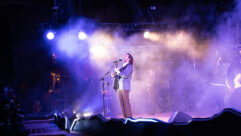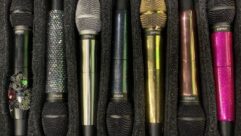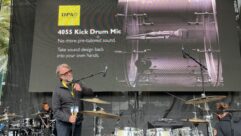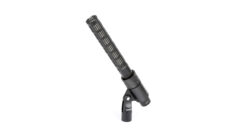
NEW YORK, MARCH 7, 2017 – As audio consultant and sound mixer for the popular PBS series, Live From Lincoln Center, Paul Bevan is given the enviable task of capturing the amazing live audio of some of the world’s greatest performing artists in concert. As a specialist in mixing and amplifying orchestras in large venues, Bevan understands the need to use microphones that capture the natural sound of the instruments. In order to achieve that sound, he relies on a selection of DPA microphones for his amplification needs.
“I have had the privilege of consulting and coordinating audio for three Live From Lincoln Center television tapings in the past two years,” says Bevan. “My job is to balance the different requirements of capturing high fidelity sound for the television show, versus the ability to get a great sound in the hall so that the audience also enjoys the performance. This is essential in getting an energetic performance from the musicians and makes for a great ‘vibe’ for the show.”

This recent Live from Lincoln Center project was entitled Joshua Bell: Seasons of Cuba. The concert was taped at the world-renowned performance arts complex Rose Hall and featured Grammy Award-winning violinist, Joshua Bell, Dave Matthews, The Chamber Orchestra of Havana and several Cuban musicians and singers, including Cuban soprano Larisa Martinez.
In all, the production used two d:screet SC4061s on Bell’s lapel for the violin and Martinez’s hairline, two d:vote 4099P mics for piano, one d:vote 4099S mic for saxophone and all the vocal mics were DPA’s d:facto MMC4018V capsules.

“All the DPA mics I have used have such wonderful clarity that I do not have to do any unnatural boosting of high end, which can lead to harshness,” adds Bevan. “I will use DPA mics as a first choice on any upcoming orchestra projects – either for TV tapings or for amplified performances in large venues.”
The other essential element is that the microphones must be as ‘invisible’ as possible, as to not detract from the beautiful aesthetics of the show. “DPA gives me microphones that sound amazing in the hall, do not pick up a lot of the PA and are conducive to a great look on camera,” adds Bevan. “I have used DPA microphones in many situations for several years and they are wonderful. I am happy to once again be able to use them for this year’s Live From Lincoln Center concert series.”
According to Bevan, his primary challenge during the television taping is to get an uncolored recording, while still getting a good and present level in the house mix. The ProTools recording engineer never had to ask Bevan to turn anything down in the house mix and was astonished by how little he heard the PA coming back into the microphones. This is not usually the case in these situations.
Another one of the major issues he faced this year was the inability to physically attach anything to Grammy-Award Winning Musician Joshua Bell’s violin. “Even the no-impact DPA rubber mounts that I have used with many other artists were not allowed,” says Bevan. “This is a four-million-dollar instrument and cannot be touched by anything except Joshua’s fingers. I put a DPA d:screet SC4061 Miniature Omnidirectional Microphone on Joshua’s lapel on the opposite side of the violin, which gave a lovely warm sound from the violin. Joshua was also the evening’s M.C. and the microphone on his lapel picked up his spoken introductions perfectly. The TV producers greatly appreciated not having to put a vocal mic in front of him.”
The second performer, Cuban soprano Larisa Martinez, also had a d:screet SC4061 hidden inside her hairline with clips, which was invisible to the audience and cameras, but gave a beautiful natural sound, with all her wonderful dynamics. Using small Sennheiser wireless packs allowed the performers plenty of freedom of movement.
Another challenge presented was the producers’ desire to have the piano lid removed, so that there were no unwanted reflections on the set. “This was an added challenge in having hidden mics, while reducing the amount of bleed from the rhythm section and orchestra into the piano mics,” Bevan said. “I achieved this with a couple of d:vote 4099P Instrument Microphones for Piano on magnetic mounts. Their excellent supercardioid, off-axis rejection kept bleed to a minimum, while capturing a very natural piano sound. Finally, I rounded out the instruments by using a d:vote 4099S Instrument Microphone for Saxophone.“
Bevan had also been wanting to try DPA’s d:facto MMC4018V Supercardioid Microphone Capsule for Vocal for some time and the perfect opportunity presented itself when he needed to capture vocals for recording artist Dave Matthews and Cuban singer-songwriter Carlos Varela, both of whom also participated in the series. “Dave Matthews has somewhat of a ‘low-mid’ heavy voice and the extra clarity from the d:facto MMC4018V capsules helped in reducing the amount of EQ-ing I had to do to get his lyrics to be very clear over an orchestra and rhythm section,” he says. “Carlos Varela sounded wonderful on this microphone too. His soulful songs were even more chilling with the wonderful air and clarity that this microphone provided.”
ABOUT DPA MICROPHONES:
DPA Microphones is the leading Danish Professional Audio manufacturer of high-quality condenser microphone solutions for professional applications. DPA’s ultimate goal is to always provide its customers with the absolute finest possible microphone solutions for all its markets, which include live sound, installation, recording, theatre and broadcast. When it comes to the design process, DPA takes no shortcuts. Nor does the company compromise on its manufacturing process, which is done at the DPA factory in Denmark. As a result, DPA’s products are globally praised for their exceptional clarity and transparency, unparalleled specifications, supreme reliability and, above all, pure, uncolored and undistorted sound.
For more information on DPA Microphones, please visit www.dpamicrophones.com










